This is the "latest" release of Envoy Gateway, which contains the most recent commits from the main branch.
This release might not be stable.
Please refer to the /docs documentation for the most current information.
Admin Console
4 minute read
Envoy Gateway provides a built-in web-based admin console that offers a comprehensive interface for monitoring, debugging, and managing your Envoy Gateway deployment. The admin console provides real-time visibility into the control plane status, configuration state, performance metrics, and debugging capabilities.
Prerequisites
Follow the steps below to install Envoy Gateway and the example manifest. Before proceeding, you should be able to query the example backend using HTTP.
Expand for instructions
Install the Gateway API CRDs and Envoy Gateway using Helm:
helm install eg oci://docker.io/envoyproxy/gateway-helm --version v0.0.0-latest -n envoy-gateway-system --create-namespaceInstall the GatewayClass, Gateway, HTTPRoute and example app:
kubectl apply -f https://github.com/envoyproxy/gateway/releases/download/latest/quickstart.yaml -n defaultVerify Connectivity:
Get the External IP of the Gateway:
export GATEWAY_HOST=$(kubectl get gateway/eg -o jsonpath='{.status.addresses[0].value}')Curl the example app through Envoy proxy:
curl --verbose --header "Host: www.example.com" http://$GATEWAY_HOST/getThe above command should succeed with status code 200.
Get the name of the Envoy service created the by the example Gateway:
export ENVOY_SERVICE=$(kubectl get svc -n envoy-gateway-system --selector=gateway.envoyproxy.io/owning-gateway-namespace=default,gateway.envoyproxy.io/owning-gateway-name=eg -o jsonpath='{.items[0].metadata.name}')Get the deployment of the Envoy service created the by the example Gateway:
export ENVOY_DEPLOYMENT=$(kubectl get deploy -n envoy-gateway-system --selector=gateway.envoyproxy.io/owning-gateway-namespace=default,gateway.envoyproxy.io/owning-gateway-name=eg -o jsonpath='{.items[0].metadata.name}')Port forward to the Envoy service:
kubectl -n envoy-gateway-system port-forward service/${ENVOY_SERVICE} 8888:80 &Curl the example app through Envoy proxy:
curl --verbose --header "Host: www.example.com" http://localhost:8888/getThe above command should succeed with status code 200.
Overview
The admin console is automatically enabled and provides the following key features:
- Dashboard: Overview of system status and quick access to all features
- Server Information: Detailed runtime information about Envoy Gateway components
- Configuration Dump: Real-time view of Gateway API resources and their status
- Statistics: Control plane metrics in Prometheus format
- Performance Profiling: pprof endpoints for debugging and performance analysis
Accessing the Admin Console
By default, the admin console is available on localhost:19000. There are two ways to access it:
Method 1: Using kubectl port-forward
kubectl port-forward -n envoy-gateway-system deployment/envoy-gateway 19000:19000
Then open your browser and navigate to:
http://localhost:19000
Method 2: Using egctl dashboard command
You can install egctl by following the installation guide.
egctl x dashboard eg
This command will automatically set up port forwarding and open the admin console in your default browser.
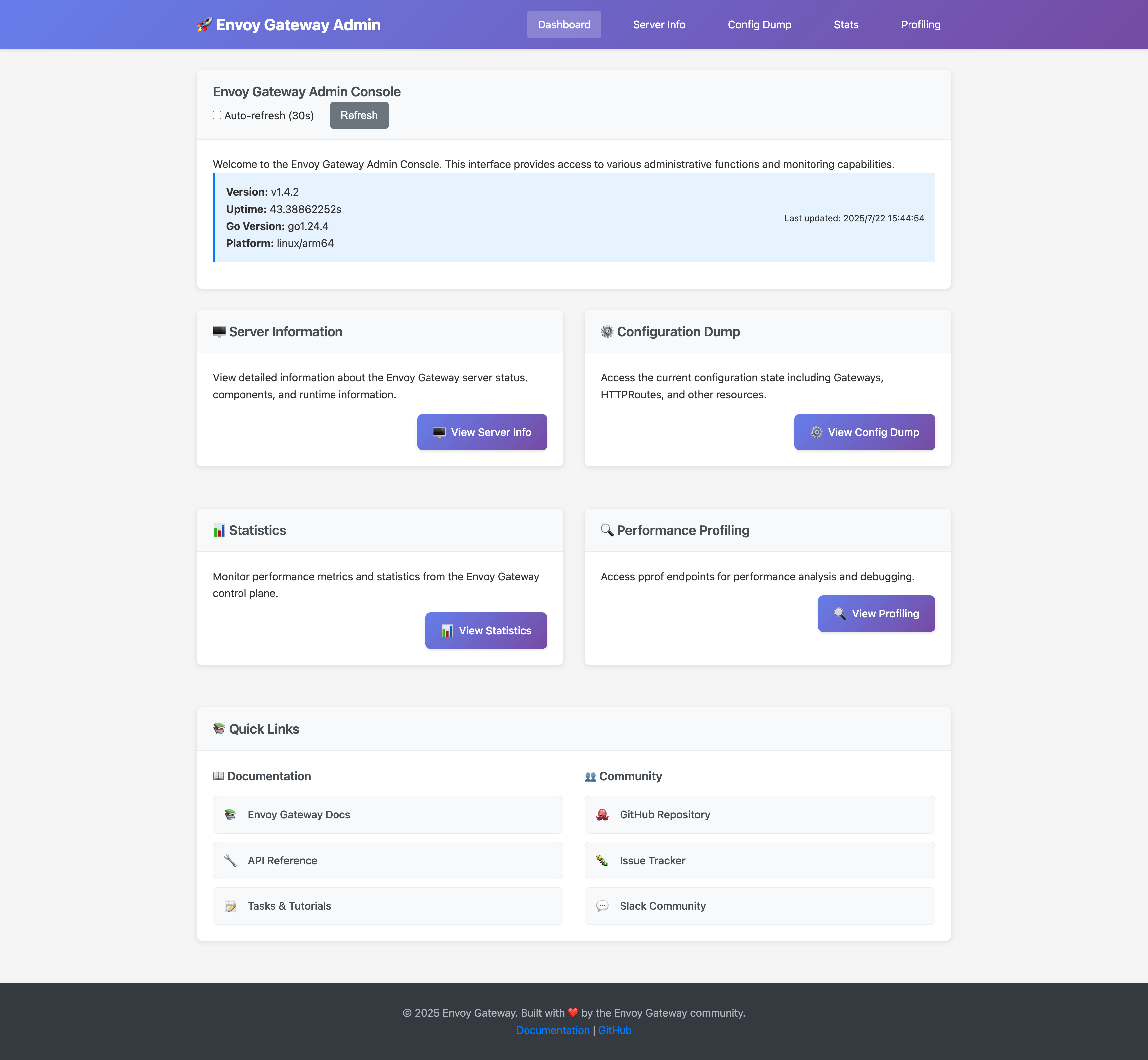
Configuration
The admin console can be configured through the EnvoyGateway configuration resource:
Development Configuration
For development environments, you may want to enable additional debugging features:
apiVersion: gateway.envoyproxy.io/v1alpha1
kind: EnvoyGateway
metadata:
name: envoy-gateway-dev
namespace: envoy-gateway-system
spec:
admin:
address:
# Allow external access (use with caution)
host: "0.0.0.0"
port: 19000
# Enable pprof for performance debugging
enablePprof: true
Production Configuration
For production environments, use more restrictive settings:
apiVersion: gateway.envoyproxy.io/v1alpha1
kind: EnvoyGateway
metadata:
name: envoy-gateway-prod
namespace: envoy-gateway-system
spec:
admin:
address:
# Localhost only for security
host: "127.0.0.1"
port: 19000
# Disable pprof in production
enablePprof: false
Features
Dashboard
The main dashboard provides:
- System Information: Version, uptime, and platform details
- Component Status: Real-time status of all Envoy Gateway components
- Quick Navigation: Easy access to all admin console features
- Auto-refresh: Automatic updates every 30 seconds

Server Information
The server info page displays:
- Component Health: Status of Provider Service, GatewayAPI Translator, xDS Translator, and Infrastructure Manager
- Runtime Details: Version information, uptime, and system metrics
- Configuration: Current EnvoyGateway configuration settings
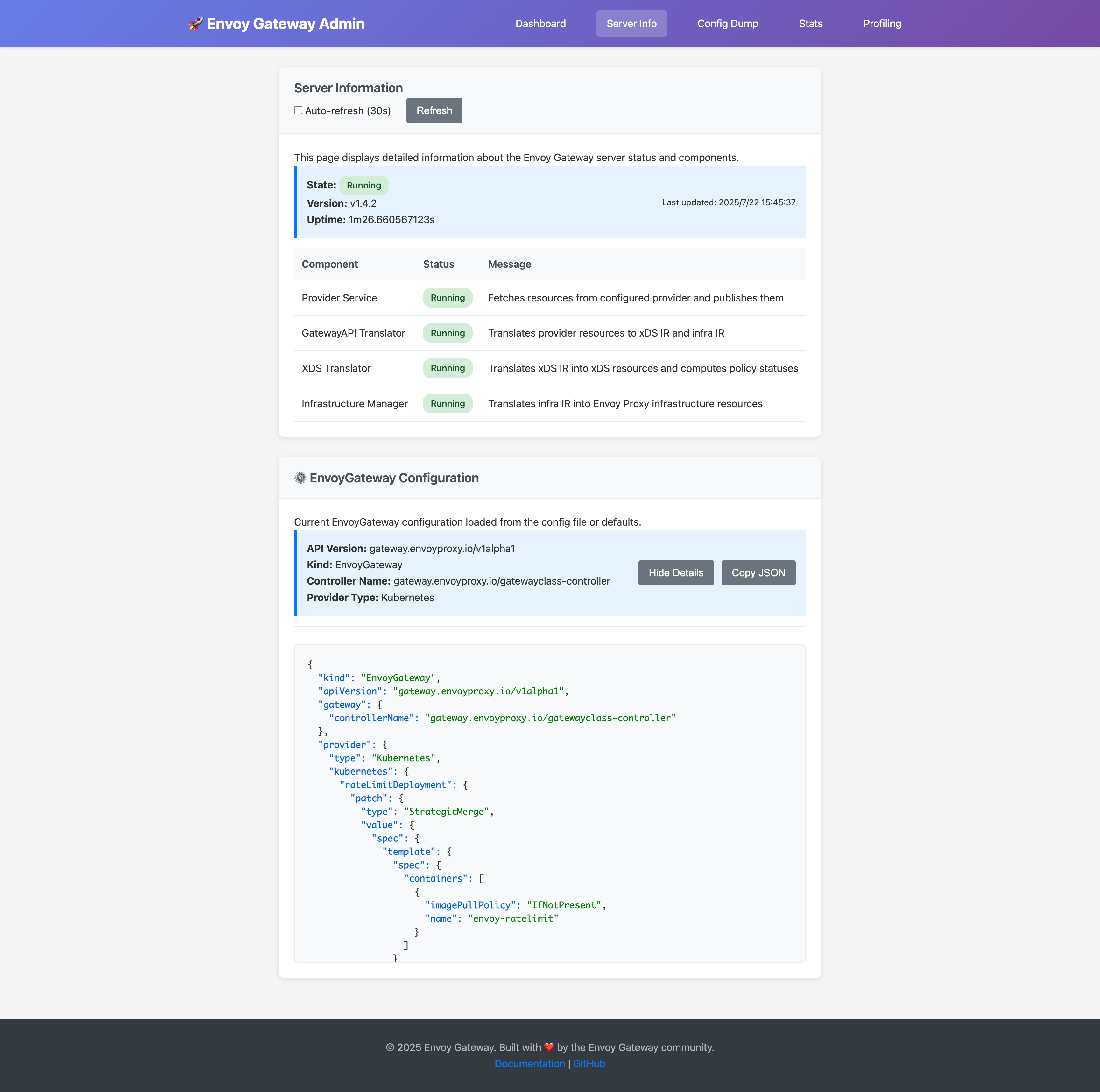
Configuration Dump
The config dump feature provides:
- Resource Explorer: Browse all Gateway API resources (Gateways, HTTPRoutes, etc.)
- Search Functionality: Find resources by name or namespace
- Real-time Updates: Live view of configuration changes
- JSON Export: Download complete configuration as JSON
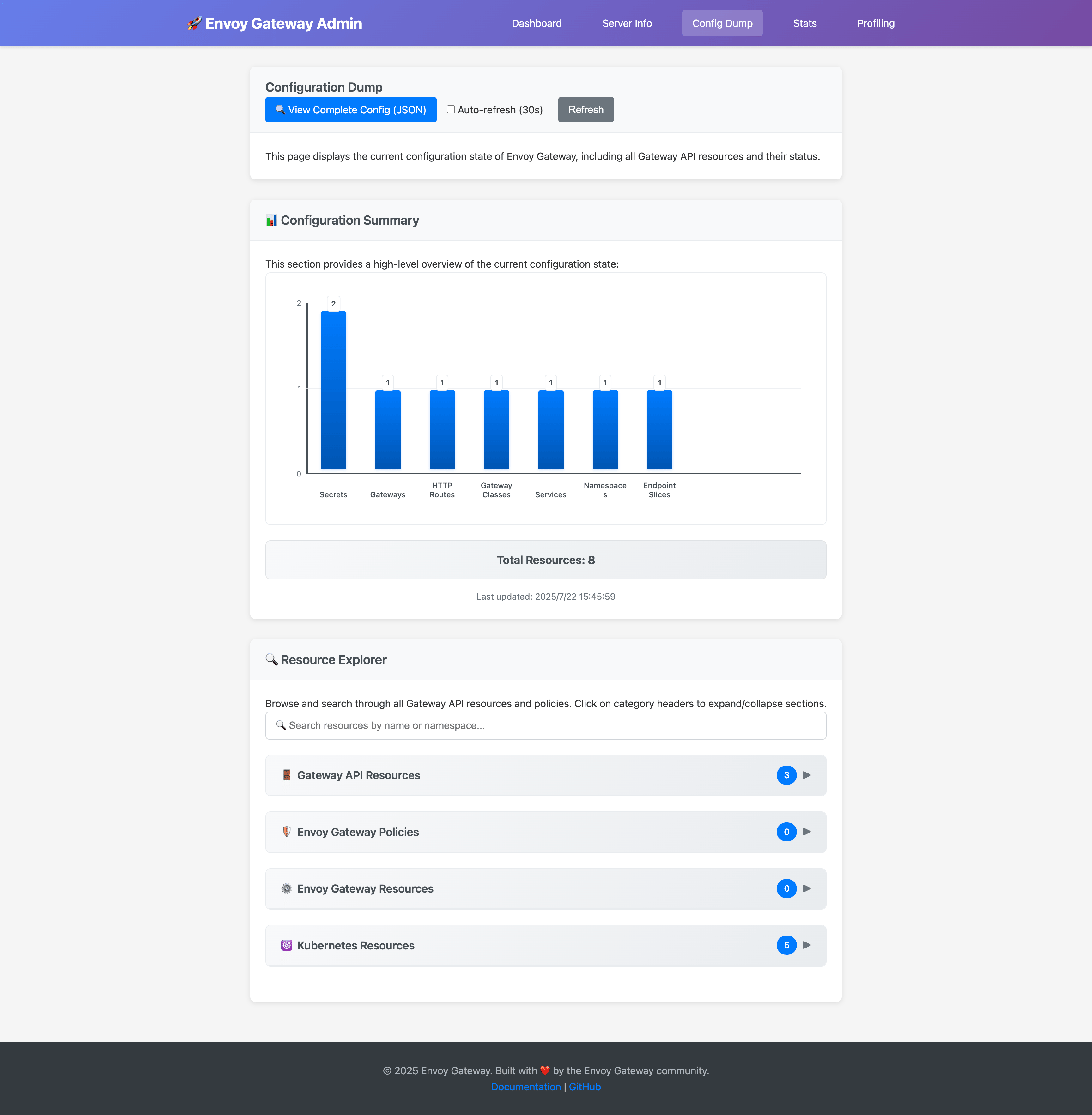
The search functionality allows you to quickly find specific resources:
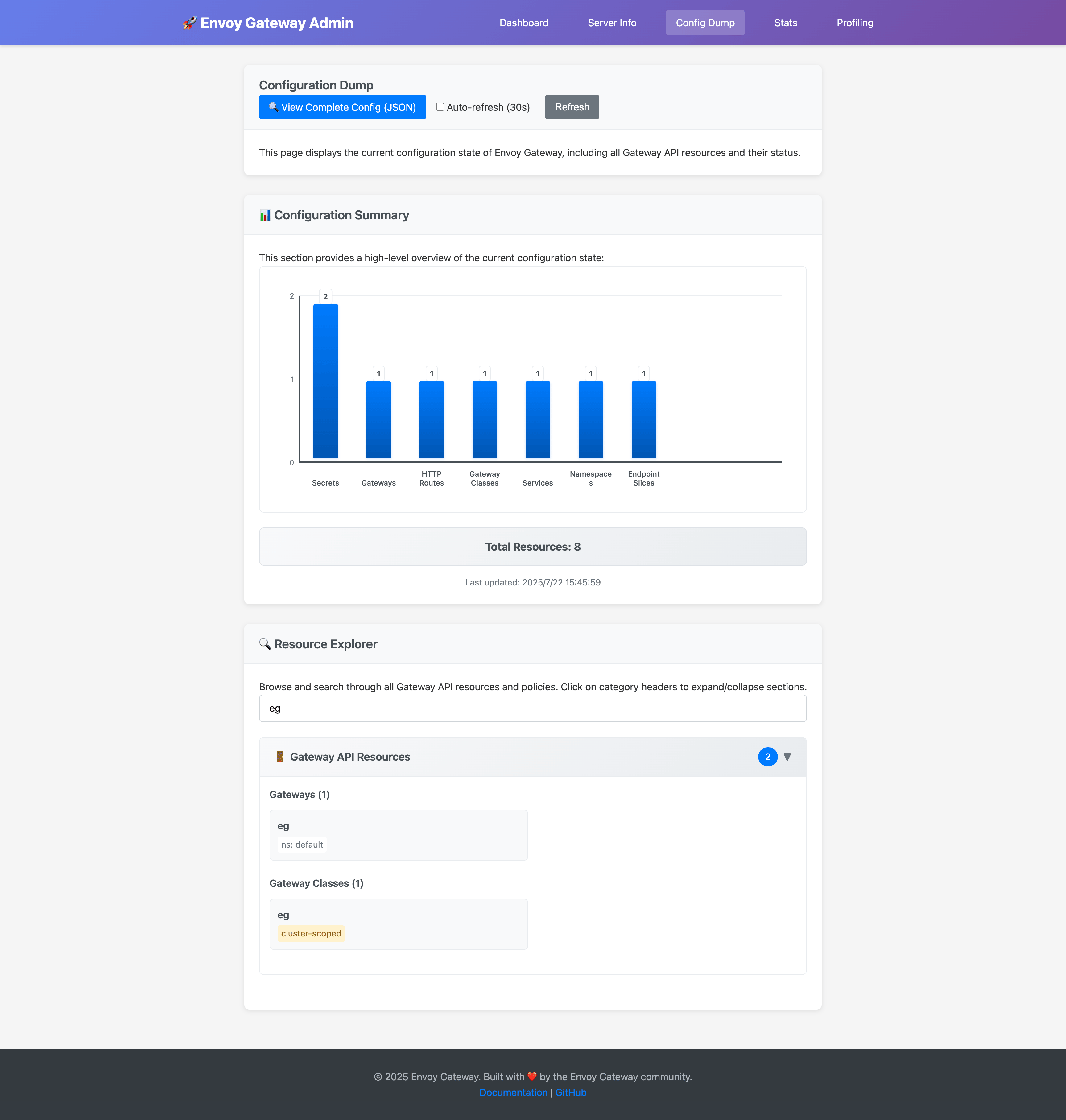
You can also view the complete configuration dump in JSON format:
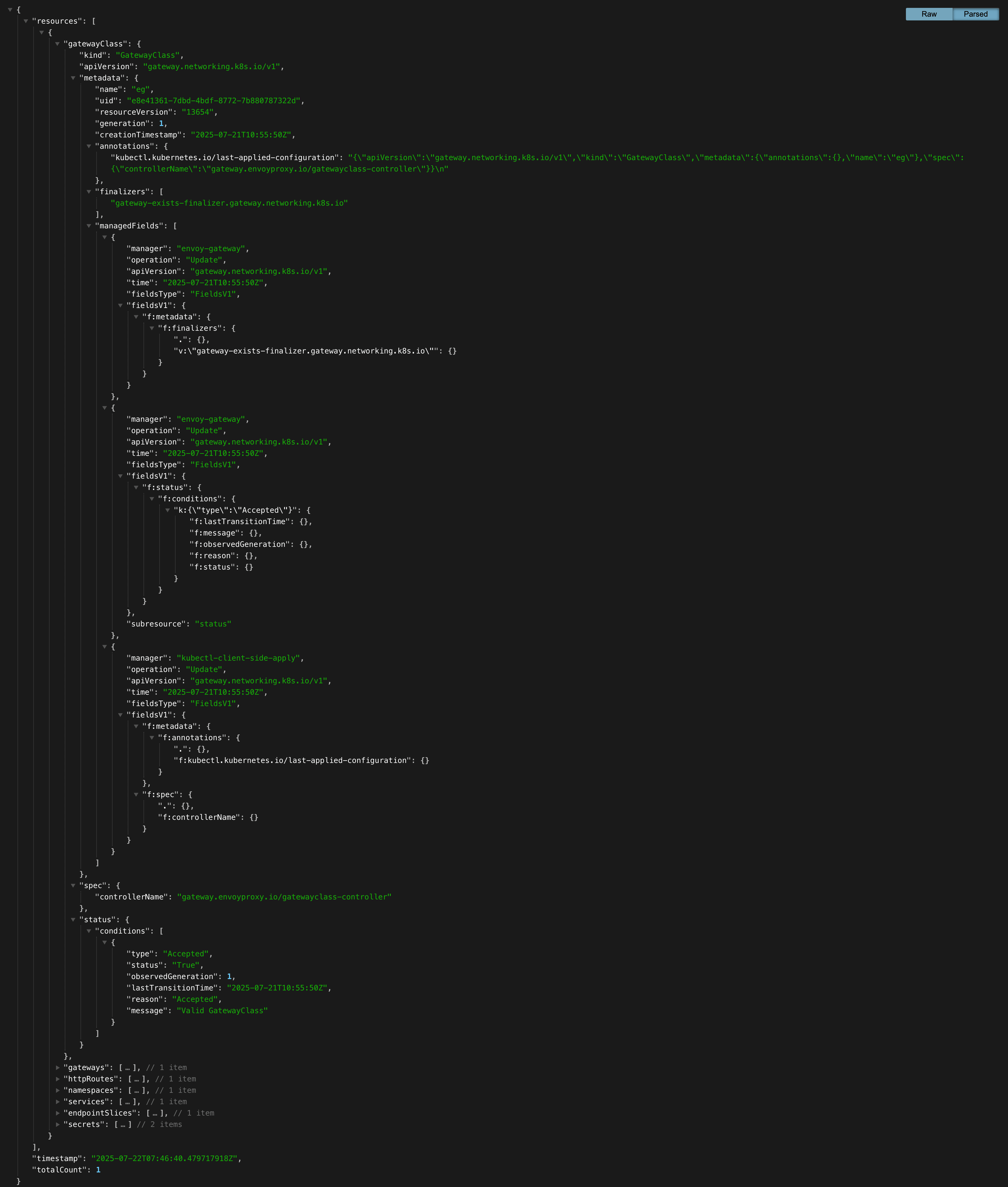
Statistics
The statistics page offers:
- Prometheus Metrics: All control plane metrics in Prometheus format
- Metrics Categories: Organized view of different metric types:
- Watching Components (event-driven architecture metrics)
- Status Updater (resource status update metrics)
- xDS Server (proxy configuration delivery metrics)
- Infrastructure Manager (Kubernetes resource operation metrics)
- Wasm (WebAssembly extension metrics)
- Topology Injector (node topology injection metrics)
Access metrics directly via: http://localhost:19000/api/metrics
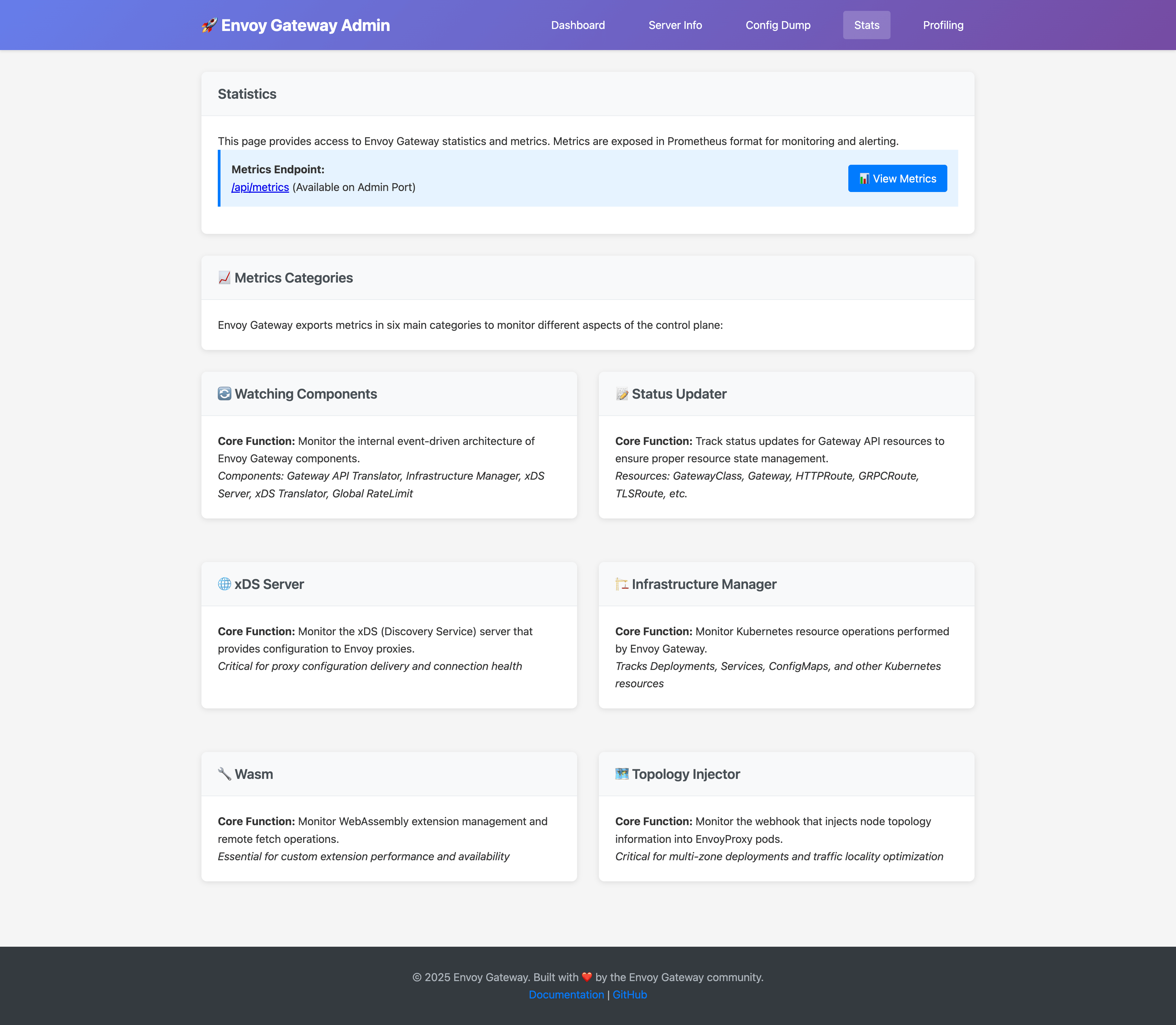
The metrics endpoint provides detailed Prometheus metrics:

Performance Profiling
When enablePprof is set to true, the profiling page provides:
- CPU Profile: Analyze CPU usage patterns
- Memory Heap: Monitor memory allocation and identify leaks
- Goroutines: Debug concurrency issues and goroutine leaks
- Mutex/Block: Find contention points in the application
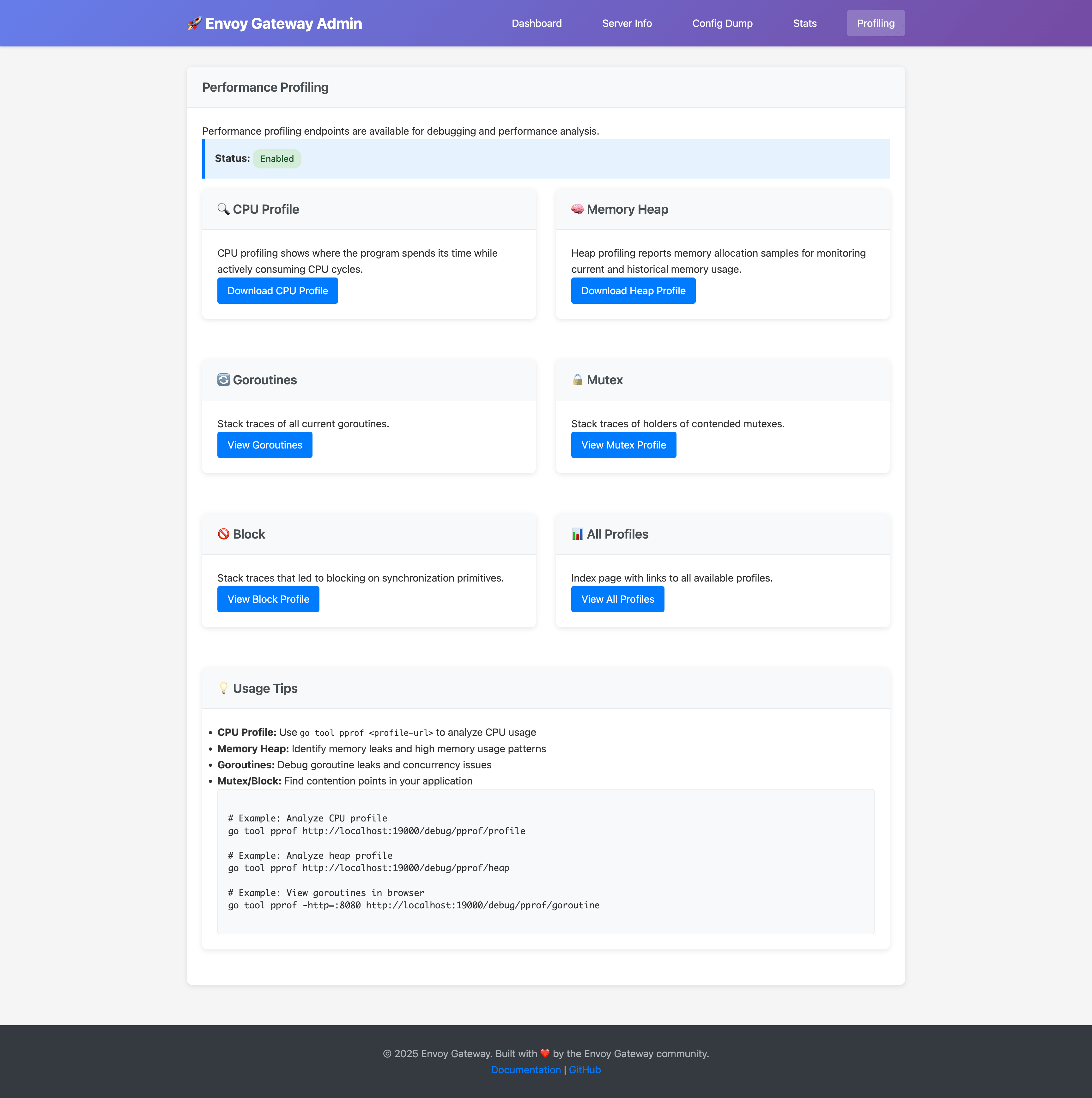
Security Warning
Only enable pprof endpoints in development or debugging scenarios. These endpoints can expose sensitive information and should not be enabled in production environments.Feedback
Was this page helpful?
Glad to hear it! Please tell us how we can improve.
Sorry to hear that. Please tell us how we can improve.